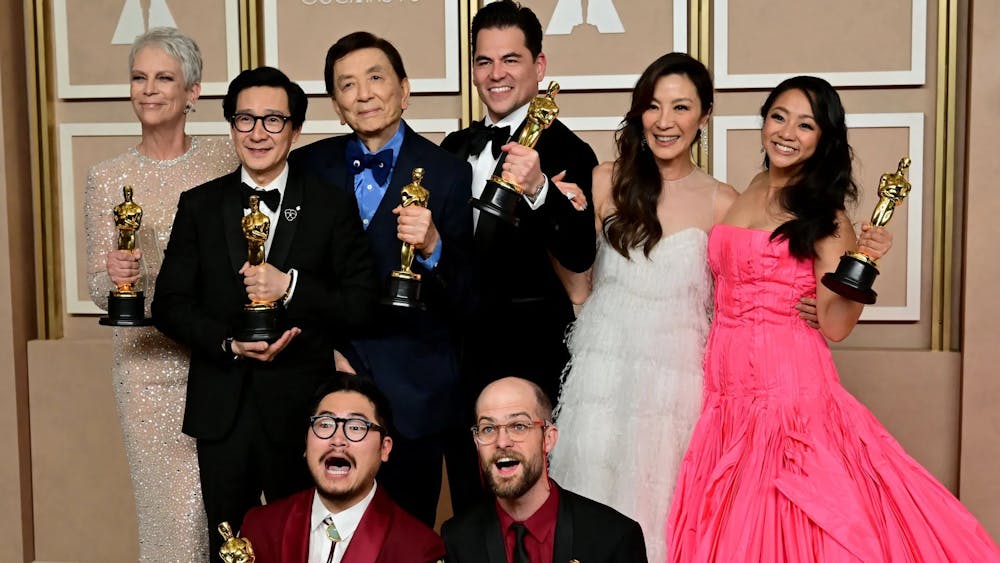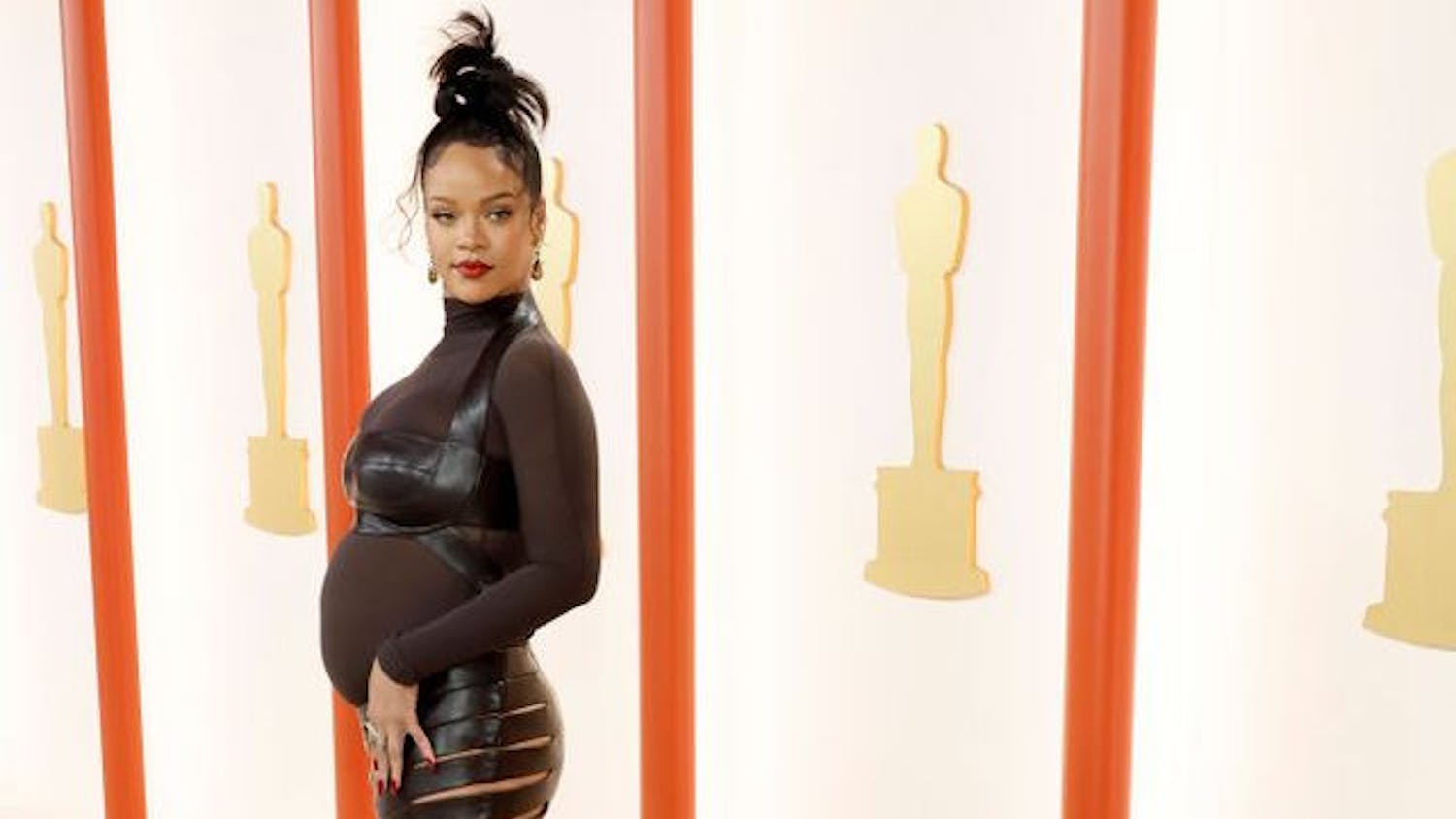The Oscars took place last Sunday, March 12, crowning the mind-bending action sci-fi film “Everything Everywhere All At Once” this year’s Best Picture. The film’s astonishing seven wins were never guaranteed — it had faced relentless doubts about its awards chances since its debut last spring — but that only made its ultimate success all the more exciting to see.
To give you an idea of the magnitude of its victory, not only did “Everything Everywhere” shut out veteran filmmakers like Steven Spielbierg and Martin McDonagh, but it was also the first film to ever win three acting awards and Best Picture, and the first science fiction movie to ever win Best Picture. Now “Turn Down For What” is a music video directed by Oscar-winning directors. What a night.
Michelle Yeoh won Best Actress for her complex portrayal of Evelyn Wang, an unlikely hero and multiverse-traveling mother who captured the emotional heart of her movie. She won a nail-biter race against two-time winner Cate Blanchett, nominated for playing tortured conductor Lydia Tár, in a contest that pitted two tremendous performances against one another.
As the first Asian to win Best Actress, Yeoh represents her own several decades of work in the film industry, as well as the many other women of color who have been historically excluded from this category.
“For all the little boys and girls who look like me watching tonight, this is a beacon of hope and possibilities. This is proof that dreams do come true,” Yeoh said during her acceptance speech.
As anticipated, Ke Huy Quan won Best Supporting Actor for his return to acting for the first time in 20 years in “Everything Everywhere All At Once.” Although Barry Keoghan took the British Academy of Film and Television Arts (BAFTA) award for his comedic village loner in “The Banshees of Inisherin,” Quan garnered universal acclaim and swept through the SAG, Critics Choice and Golden Globes with his astounding versatility and heartfelt speeches about his return to the film industry and persistence against adversity.
For previously snubbed actors, like actors Ke Huy Quan, Michelle Yeoh and Brendan Fraser, their wins this year represented the culmination of their careers and the long journeys throughout the film industry that brought them to the stage.
The Best Actor race has seen dramatic shifts in momentum this year. Front runner status constantly shifted between Austin Butler for his bombastic portrayal of Elvis, Brendan Fraser’s emotional role in “The Whale” that captivated fall film festivals, and critics’ favorite Colin Farrell’s tragically goofy Irishman. Ultimately, the King of Rock ’n Roll was not victorious, as Fraser was crowned Best Actor. We’ll never know if Butler would have given his victory speech in his real voice or the Elvis impression he appears to have permanently adopted.
The win for Fraser came after years of exclusion and disrespect in the film industry after speaking out about being sexually harassed by Philip Berk in 2003, who was then the president of the Hollywood Foreign Press Association.
“I started in this business 30 years ago and things didn’t come easily to me, but there was a facility that I didn’t appreciate at the time until it stopped,” Fraser said in his acceptance speech.
Best Supporting Actress was a hard-fought race until the end, with Jamie Lee Curtis ultimately claiming the final award over Kerry Kondon and Angela Bassett for her portrayal of Deidre, a belligerent IRS agent in “Everything Everywhere All At Once.” Who’s to say what compelled the Academy to reward Curtis’ performance: her brutally honest tax audits, the epic battles with Michelle Yeoh’s character or the hot dog fingers?
Curtis’ two main competitors had each claimed significant precursor awards, but the wave of passion for “Everything Everywhere” (as well as the industry respect for her long career) was enough to turn this first nomination into a win.
Best Original Screenplay, a category that featured a nomination for the biting Irish humor of the “Banshees of Inisherin,” also went to “Everything Everywhere All At Once.” Best Adapted Screenplay rewarded “Women Talking” for its poignant discussions by Mennonite women about the violence perpetrated by the men in their community.
The craft categories delivered some of the most surprising upsets of the night. Netflix’s chilling adaption of “All Quiet on the Western Front” managed to win both Best Score and Best Production Design over the extravagantly produced “Babylon” by “La La Land” director Damien Chazelle.
The movie also captured Best Cinematography after “Top Gun: Maverick”’s surprising nomination snub back in January, as well as taking Best International Feature Film for Germany. “All Quiet on the Western Front” deservedly won for its hauntingly beautiful depiction of World War I played out across snowy forests and battlefields blanketed in artillery fire.
The only film that could have challenged “All Quiet”’s victory for International Film was 3-hour blockbuster “RRR,” but India declined to submit the film for contention in that category. “RRR” still managed to claim the award for Best Song for “Naatu Naatu” over Rihanna, Lady Gaga and Mitski.
The genuine depiction of an Asian family struggling to connect across generations and multiverses in “Everything Everywhere All At Once” was beloved enough to sweep through the Oscars this year. This year’s award season and its monumental comebacks for the individuals and movies themselves could mean we have entered a new era in cinema. Out of all the universes out there, let’s hope we really do live in the one where creativity is rewarded, movies can get weird and the Oscars actually recognize the best work of the year.

Ryan McElroy '25 (he/him) is the Editor in Chief.
Ryan has previously served as a Managing Editor, News Editor and Staff Writer. He is majoring in history with a minor in art history. Outside of The Campus, he is co-captain of Middlebury Mock Trial and previously worked as Head Advising Fellow for Matriculate and a research assistant in the History department. Last summer Ryan interned as a global risk analyst at a bank in Charlotte, North Carolina.




